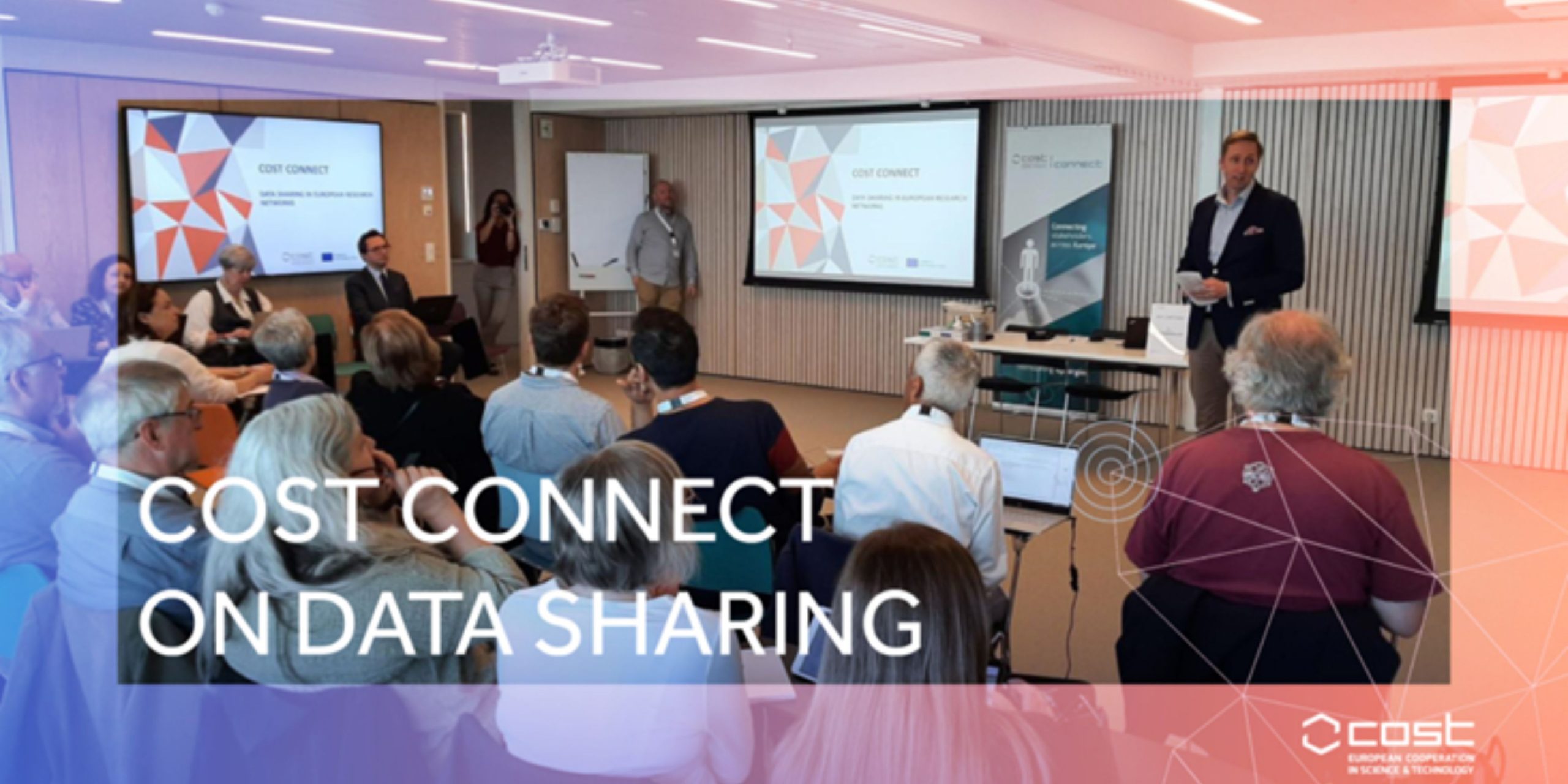COST Action networks can involve hundreds of researchers and innovators and these networks have shown innovative and diverse ways in how they collect, manage, use, share, and visualise data. Given the bottom-up and interdisciplinary nature of COST Actions, data-sets vary widely and cover domains as diverse as mobility, space, vegetation, migration, archaeology, and genomics.
Good data management is a critical component of successful research networks but Open Science leads to new challenges for data management. There are technical challenges to address such as how to incorporate global vs local standards. There are organisational issues such as safeguarding the long-term maintenance, metadata, and data standards. And finally there are more community focused like problems like ownership, consent, and privacy.
COST Connect on data sharing in European research networks
On 27 and 28 of April 2023, COST hosted a COST Connect event to explore data sharing. This event brought representatives of a broad range of COST Actions together with relevant stakeholders to get an understanding of the diverse ways and methods COST Actions approach data sharing, create synergies and explore future interdisciplinary collaborations, and establish a group of multidisciplinary experts working on data-related matters.
External stakeholders from the European University Association (EUA) and the European Open Science Cloud (EOSC) joined to provide their external expertise and views on the topic.
Federica Garbuglia from the European University Association presented some of the most interesting highlights from a follow-up report to the 2020-21 EUA Open Science survey focusing on research data practices in European universities.
EOSC is working to create a web of FAIR data and related services for research to help unlock the full potential of data to accelerate discoveries and innovation – in short an open and seamless services for storing, managing, analysing and re-using research data. In his intervention, Karel Luyben, President of EOSC, advocated for the appointment of data champions, encouraged Universities to invest in hiring data stewards, and stressed how FAIR is the most important requirement for the future of data sharing. He highlighted how EOSC will only work if the culture can be changed:
During the event COST Action participants had the opportunity to present their research network, exchange views, and make new connections. In breakout sessions participants convened to discuss the most pressing topics for them including sustainability, incentives, regulation, interoperability, linking data sets, and ontology.
COST Actions active in the field
With over 20 COST Actions represented at the event today we zoom in on three of them to understand what data they are managing and the accomplishments they have made so far in their sectors:
The European Tracking Network (ETN) works to track aquatic animals across Europe to better understand, protect and manage them. They are ensuring a transition from a loosely-coordinated set of existing regional telemetry initiatives to a sustainable, efficient, and integrated pan-European biotelemetry network.
So far the Action has 416 users, 4038 active deployments, 19115 tags, 126 species, and 715 million + detections. Respecting FAIR data principles has been at the heart of the network so far: their data is Findable (good description of metadata, using the IMIS catalogue, and opportunity to create a DOI); Accessible (Open Data as much as possible, data available through several platforms); Interoperable (standard names through metadata files, unique identifiers for each metadata item, transfers to other data repositories (OTN and EurOBIS)); and Reusable (findable in other repositories (OTN), downloadable via Rstudio and app, standardise datasets).
EUdaphobase are working to develop the procedures and concepts needed to establish a pan-European data warehouse for soil biodiversity. The Action is expanding the data infrastructure Edaphobase; a data warehouse (more than another database) due to its integration of heterogeneous data from various sources (literature data, ‘raw’ project data, museum collections), standardising and structuring it in a homogenous form, and making all data available together for common re-use.
The Action has already: improved the user interface; developed a data policy and data-sharing agreement; standardised all nomenclatures and data-fields in European consensus; uploaded thousands of soil-biodiversity data records from across Europe with a focus on Eastern Europe, which has been neglected in previous initiatives. Next steps will include: establishing an international quality-control review board, which will review data submissions beyond the Action’s duration; preparing an ‘Atlas of European Soil Fauna‘ based on previous and ongoing data collation efforts; standardising species’ character traits, in order to aggregate species-specific occurrence data into functional groups and relate these to soil functions; linking Edaphobase to other international databases like BETSI, EcoTaxonomy and FungalTraits; and approaching European stakeholders to assess their soil-biodiversity assessment needs.
The Grapevine Genomics Encyclopedia (Grapedia) is an innovative portal to integrate knowledge, resources, and services for the grape scientific community and industry. It is a social data-driven platform where scientists, breeders, producers, and consumers will be able to exchange information and it converges different sources of Open Access data, integrating biological knowledge, genetic and genomic resources.
Grapedia is a newly funded COST Innovators Grant and a follow up to the COST Action INTERGRAPE and there is much work to be done! Although INTEGRAPE contributed towards the release of the latest and most updated reference genome assembly of grape and the world’s largest gene catalog of functional data, these in resources are not fully interoperate, neither are they linked to other important, highly-accessed resources generated by the community (such as the grapegenomics.com). Grapedia aims to integrate and intercommunicate these resources, offering them to the community in an innovative, dynamic, and centralised portal.
This CIG project will also implement innovative technologies such as deep learning and modelisation methods to provide a service to companies in order for them to adapt their production, being aware of the impact of climate transition. These tools will also allow growers to assess the level of sustainability of their vineyard.
Source: COST I News (https://bit.ly/3nCA0zy)
